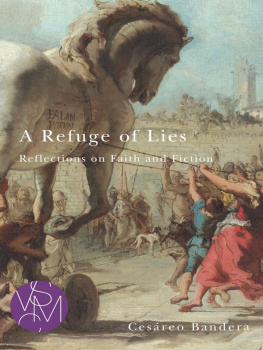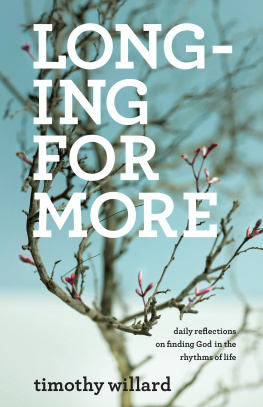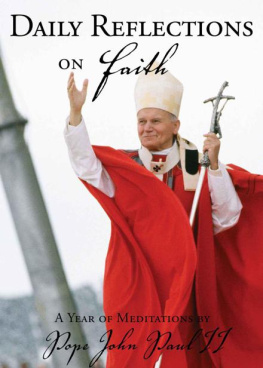Bandera - A Refuge of Lies: Reflections on Faith and Fiction
Here you can read online Bandera - A Refuge of Lies: Reflections on Faith and Fiction full text of the book (entire story) in english for free. Download pdf and epub, get meaning, cover and reviews about this ebook. year: 2013, publisher: Michigan State University Press, genre: Religion. Description of the work, (preface) as well as reviews are available. Best literature library LitArk.com created for fans of good reading and offers a wide selection of genres:
Romance novel
Science fiction
Adventure
Detective
Science
History
Home and family
Prose
Art
Politics
Computer
Non-fiction
Religion
Business
Children
Humor
Choose a favorite category and find really read worthwhile books. Enjoy immersion in the world of imagination, feel the emotions of the characters or learn something new for yourself, make an fascinating discovery.
A Refuge of Lies: Reflections on Faith and Fiction: summary, description and annotation
We offer to read an annotation, description, summary or preface (depends on what the author of the book "A Refuge of Lies: Reflections on Faith and Fiction" wrote himself). If you haven't found the necessary information about the book — write in the comments, we will try to find it.
Bandera: author's other books
Who wrote A Refuge of Lies: Reflections on Faith and Fiction? Find out the surname, the name of the author of the book and a list of all author's works by series.
A Refuge of Lies: Reflections on Faith and Fiction — read online for free the complete book (whole text) full work
Below is the text of the book, divided by pages. System saving the place of the last page read, allows you to conveniently read the book "A Refuge of Lies: Reflections on Faith and Fiction" online for free, without having to search again every time where you left off. Put a bookmark, and you can go to the page where you finished reading at any time.
Font size:
Interval:
Bookmark:

Studies in Violence, Mimesis, and Culture
SERIES EDITOR
William A. Johnsen
The Studies in Violence, Mimesis, and Culture Series examines issues related to the nexus of violence and religion in the genesis and maintenance of culture. It furthers the agenda of the Colloquium on Violence and Religion, an international association that draws inspiration from Ren Girard's mimetic hypothesis on the relationship between violence and religion, elaborated in a stunning series of books he has written over the last forty years. Readers interested in this area of research can also look to the association's journal, Contagion: Journal of Violence, Mimesis, and Culture.
ADVISORY BOARD
Ren Girard, Stanford University
Andrew McKenna, Loyola University of Chicago
Raymund Schwager, University of Innsbruck
James Williams, Syracuse University
EDITORIAL BOARD MEMBERS
Rebecca Adams, Independent Scholar
Mark Anspach, cole Polytechnique, Paris
Pierpaolo Antonello, University of Cambridge, UK
Ann Astell, University of Notre Dame
Cesreo Bandera, University of North Carolina
Maria Stella Barberi, Universit di Messina
Benot Chantre, L'association Recherches Mimtiques
Diana Culbertson, Kent State University
Paul Dumouchel, Ritsumeikan University
Jean-Pierre Dupuy, Stanford University, cole Polytechnique
Giuseppe Fornari, Universit degli studi di Bergamo
Eric Gans, University of California, Los Angeles
Sandor Goodhart, Purdue University
Robert Hamerton-Kelly, Stanford University
Hans Jensen, Aarhus University, Denmark
Mark Juergensmeyer, University of California, Santa Barbara
Cheryl Kirk-Duggan, Shaw University
Michael Kirwan, SJ, Heythrop College, University of London
Paisley Livingston, Lingnan University, Hong Kong
Charles Mabee, Ecumenical Theological Seminary, Detroit
Jzef Niewiadomski, Universitt Innsbruck
Wolfgang Palaver, Universitt Innsbruck
Joo Cezar de Castro Rocha, Universidade do Estado do Rio de Janeiro
Martha Reineke, University of Northern Iowa
Tobin Siebers, University of Michigan
Thee Smith, Emory University
Mark Wallace, Swarthmore College
Eugene Webb, University of Washington
Copyright 2013 by Michigan State University
El refugio de la mentira: Reflexiones sobre la fe y la ficcin Copyright 2013 Los Papeles del Sitio
 The paper used in this publication meets the minimum requirements of ANSI/NISO Z39.48-1992 (R 1997) (Permanence of Paper).
The paper used in this publication meets the minimum requirements of ANSI/NISO Z39.48-1992 (R 1997) (Permanence of Paper).

Michigan State University Press
East Lansing, Michigan 48823-5245
Printed and bound in the United States of America.
19 18 17 16 15 14 13 1 2 3 4 5 6 7 8 9 10
LIBRARY OF CONGRESS CATALOGING-IN-PUBLICATION DATA
Bandera, Cesareo.
A refuge of lies : reflections on faith and fiction / Cesareo Bandera.
pages cm. (Studies in violence, mimesis, and culture series)
Includes bibliographical references.
ISBN 978-1-60917-378-4 (ebook) ISBN 978-1-61186-088-7 (pbk. : alk. paper)
1. Religion and literature. 2. Philosophy and religion in literature. 3. Mimesis. 4. Truth in literature. I. Title.
PN49.B1367 2013
809'.93382dc23
2012049421
Book design by Charlie Sharp, Sharp Des!gns, Lansing, Michigan
Cover design by David Drummond, Salamander Design, www.salamanderhill.com
Cover image is The Procession of the Trojan Horse into Troy, circa 1760, by Giandomenico Tiepolo (17271804). Oil on canvas, 38.8 66.7 cm. (NG3319), National Gallery, London/Art Resource, NY.
 Michigan State University Press is a member of the Green Press Initiative and is committed to developing and encouraging ecologically responsible publishing practices. For more information about the Green Press Initiative and the use of recycled paper in book publishing, please visit www.greenpressinitiative.org.
Michigan State University Press is a member of the Green Press Initiative and is committed to developing and encouraging ecologically responsible publishing practices. For more information about the Green Press Initiative and the use of recycled paper in book publishing, please visit www.greenpressinitiative.org.
Visit Michigan State University Press at www.msupress.org
To Gabriel, budding young writer
And when he was alone, those who were about him with the twelve asked him concerning the parables. And he said to them, To you has been given the mystery of the kingdom of God, but for those outside everything is in parables; so that they may indeed see but not perceive, and may indeed hear but not understand; lest they should convert, and be forgiven. And he said to them, Do you not understand this parable? How then will you understand all the parables?
Mark 4, 1113
Strange words, indeed. But not the shocking thing that many people imagine. Christ speaks in universal terms. Let me paraphrase: The word of God has been revealed to you, but for those outside this revelation everything is in parables, they have been given nothing but parables, fictions. They do not have the meaning beyond the fiction. They see, but do not really see, for they cannot get beyond the letter; they hear, but do not understand. They cannot convert, and have their sins forgiven. For conversion and forgiveness is only through the revelation. Thus he also said to them: How is it that you do not understand this parable [of the sower]? How willyou, then, understand all parables, all narrative fictions? The key has already been given to you.
This book can be viewed as an extended commentary on this gospel passage. Interpreters think the parables are there to explain the kingdom of God, but that only works on the basis of a prior view of all parables, all fiction, in the light of the mystery of the kingdom, which is what gives them ultimate meaning. In a sense, fictions must be redeemed before they can become instruments of redemption. Otherwisethe gospel saysthey will block the path to conversion and forgiveness. They will become a stumbling block, a scandal. But this also means that beyond the space where the word of God is historically revealed lies an outside, a world where everything is turned to fiction (en parabolais ta panta ginetai), literally. And that is Homer's world. We begin there.
Erich Auerbach's Mimesis: The Representation of Reality in Western Literature, published more than sixty years ago, and reprinted more recently in 2003 with an introduction by Edward W. Said, is quite deservedly already a classic. Auerbach brought into high relief the striking and fundamental difference that exists between the two basic approaches to the textual representation of reality in Western culture. These two styles, as he called them, were archetypically displayed in Homer's poems and in the Old Testament respectively: Since we are using the two styles, the Homeric and the Old Testament, as starting points, we have taken them as finished products, as they appear in the textsfor it is in their full development, which they reached in early times, that the two styles exercised their determining influence upon the representation of reality in European literature (23). That is also the starting point of the present study, which would like to take Auerbach's basic intuition much further than he probably intended or could have anticipated.
To begin with, among the numerous stylistic differences brilliantly analyzed by the critic, a deeper difference emerges that both transcends and grounds all the others. It concerns the truth of each of the two archetypal texts, or rather, the attitude exhibited in those texts with regard to the truthof what they narrate. Coming to the Bible after an extensive and meticulous analysis of Homer's style, Auerbach is indeed quite properly amazed at the Bible's passionate concern for, and interest in, the truth of what it says. For that is precisely what he never found in Homer.
Font size:
Interval:
Bookmark:
Similar books «A Refuge of Lies: Reflections on Faith and Fiction»
Look at similar books to A Refuge of Lies: Reflections on Faith and Fiction. We have selected literature similar in name and meaning in the hope of providing readers with more options to find new, interesting, not yet read works.
Discussion, reviews of the book A Refuge of Lies: Reflections on Faith and Fiction and just readers' own opinions. Leave your comments, write what you think about the work, its meaning or the main characters. Specify what exactly you liked and what you didn't like, and why you think so.










